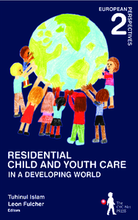Displaying 741 - 750 of 1482
Exploring the testimonials collected during a focus group and 45 individual interviews with adult alumni of such institutions the Romanian research team enrolled in the SASCA Project revealed a wide range of forms of violence and traumatic consequences.
Building on Volume 1 of the Residential Child and Youth Care in a Developing World Series that used the FIFA Football Confederation Regions to step outside contemporary discourses about residential child and youth care, further contributions from 23 UEFA countries are offered in this second volume which follows.
The objective of this study was to assess malnutrition and psychosocial dysfunction among vulnerable children as well as to determine the association between malnutrition and psychosocial dysfunction among orphan and vulnerable children in Kaski district, Nepal.
This article presents the findings of a study that examined the emotional health status and coping mechanisms of adolescents living in residential care facilities in Malaysia, in comparison with that of adolescents living in families.
This is the second briefing paper published as part of the Howard League’s two-year programme to end the criminalisation of children in residential care. It explores how good practice in the policing of children’s homes can significantly reduce the unnecessary criminalisation of vulnerable children and demand on police resources.
In this video, Catholic Relief Services, Lumos, and Maestral International presented their project: Changing the Way We Care, a project aimed at ending the institutionalization of children.
This session of the World Travel Market in London focused on orphanage tourism and featured speakers from the Better Volunteering Better Care Initiative and other partners, including Save the Children, Friends International, Lumos, and People and Places.
This resource provides quick answers to some of the frequently asked questions about the transition from institutional to family- and community-based care for children, also known as deinstitutionalisation (DI).
To accompany the release of the learning guide “Deinstitutionalisation of Europe’s Children: Questions and Answers”, the Opening Doors for Europe’s Children has prepared an online quiz to test the knowledge and tackle some of the tricky questions on deinstitutionalisation (DI).
The aim of this study has been to assess the reasons for the increased enrolment of children into orphanages and child care centres. An action research was conducted in Islamabad and Rawalpindi between November and December 2017 to assess the situation and identify the causes and circumstance that bring in and compel orphans and vulnerable children to move out after a certain age or grade.





